Age Strongly By Pushing Past Fear, Embracing Discomfort and Leaving Your Comfort Zone
Margie Warrell is an Australian motivational speaker who emboldens people to lead braver lives. She is also the author of four books: Find Your Courage, Stop Playing it Safe, Brave, and Make Your Mark. And she has interviewed fascinating characters including British billionaire Richard Branson on her Live Brave Podcast.
Margie grew up one of seven children on a small dairy farm in rural Australia. Since then, she has crossed the Sahara Desert, stayed in Palestinian refugee camps, swam with piranhas in the Amazon, and recently summited Mt Kilimanjaro with her husband Andrew and her four kids.
She has lived many places around the world including in Papua New Guinea, Washington, D.C., and Singapore. Now that she’s a year away from becoming an empty nester, she’s working on her PhD.
Did you like this episode? Please share it with the social media buttons below. I’d love it if you would rate, review, and subscribe to HappiNest on Apple Podcast, Spotify, Stitcher or Google Play.
What you’ll learn about in this episode:
- The more often we leave our comfort zone, the more comfortable we become with it. “You can build your psychological courage muscles… Living a full life involves living a brave life and embracing discomfort along the way.”
- There are periods in life where we only stick with the familiar and it isn’t serving us. Playing it safe can keep us from blossoming and growing.
- Fear is a very primal emotion. We wouldn’t survive as a species without it. Fear is wired in his to keep us alert to threats. These days we needn’t worry about being savaged by a saber-toothed tiger. But often, “fear sits in the driver’s seat in our lives.” We fear rejection, failure and public humiliation. Fear can keep us from taking actions that would serve us well. It can drive our behavior even on an unconscious level.
- Our brains are twice as sensitive to potential losses than to potential gains. We are wired to focus more on the negatives than on the positives. We often focus on things that could go wrong rather than what could go right.
- When people stay on a well-worn track and in their comfort zone, they become accustomed to the familiar and it can “confine the future.” Sign up for something, build new relationships, try things you have never done before. “The more we do it, the easier it becomes.”
- Fear regret more than you fear failure. Imagine yourself in the future. At the end of life, the biggest regrets are the risks we didn’t take.
- After your kids leave home, it’s important to look inward to consider what really interests you or makes you curious. Draw on your strengths and gifts and hard-won wisdom.
- How can you use what you have learned and are good at to help others? We get a lot of meaning and fulfillment from connecting with others.
- Find new ways to have fun with your partner. You might plan outings, travel, entertain, dance. “Bring an element of fun and playfulness into your life.”
- “Let’s age strong.”





